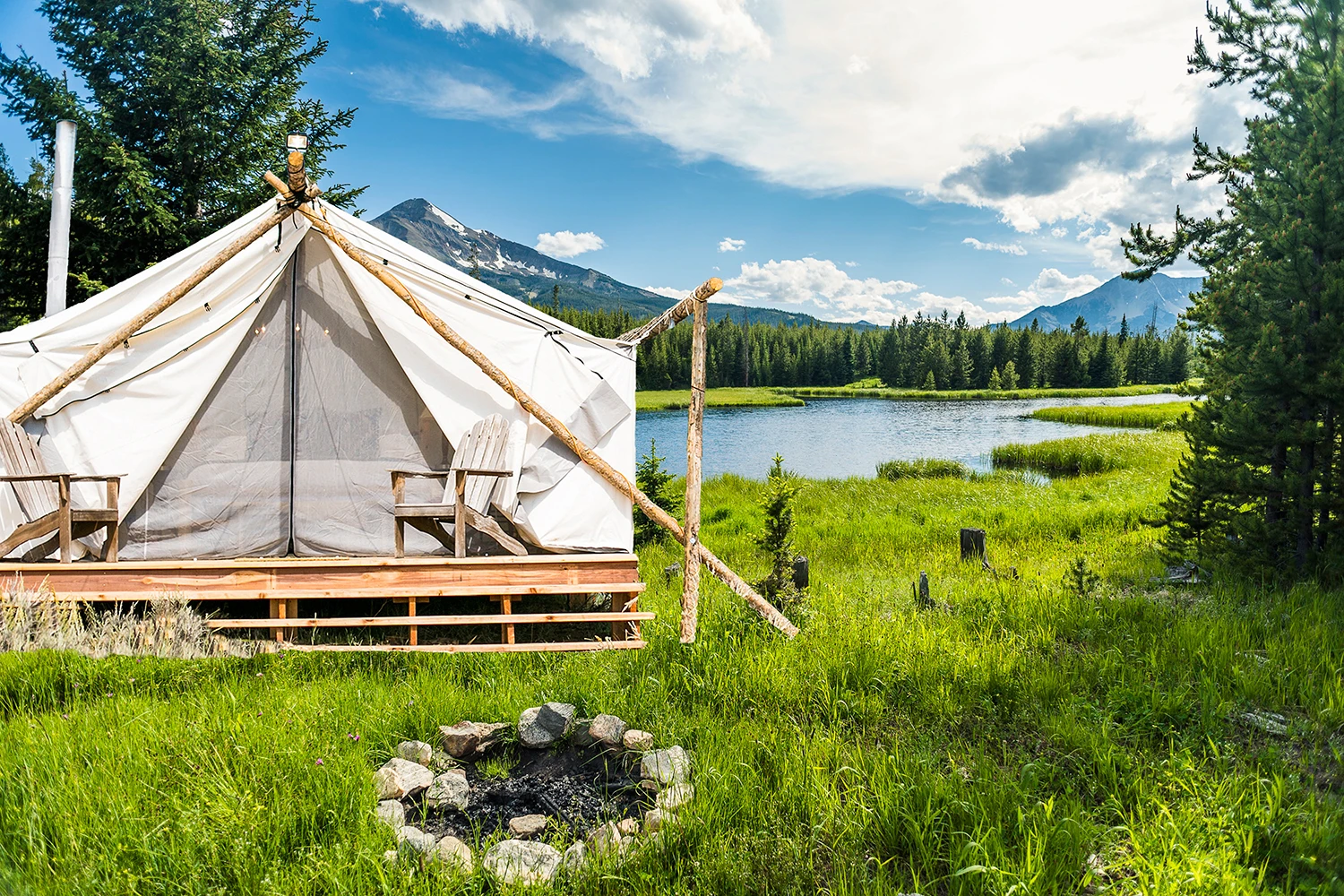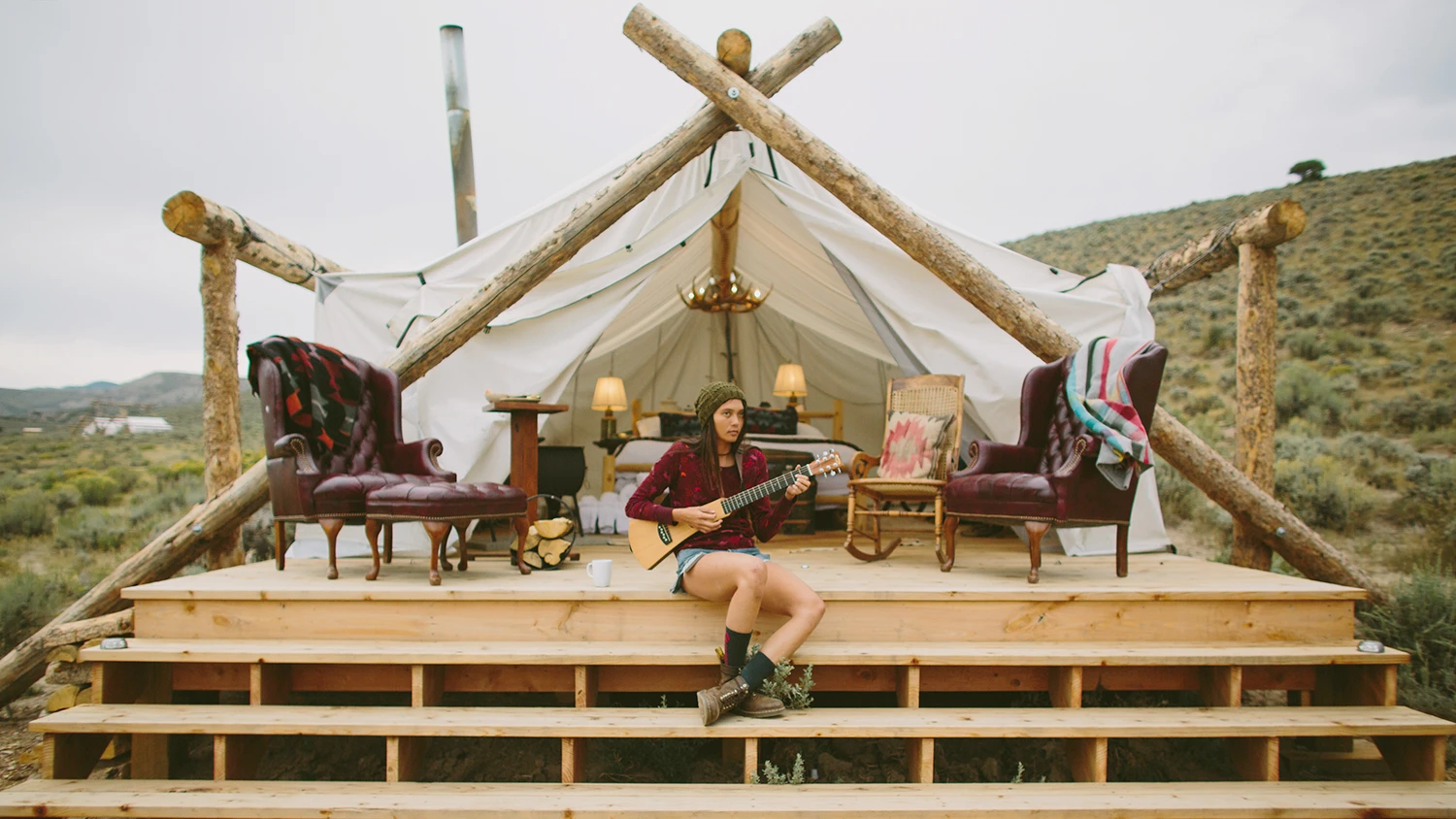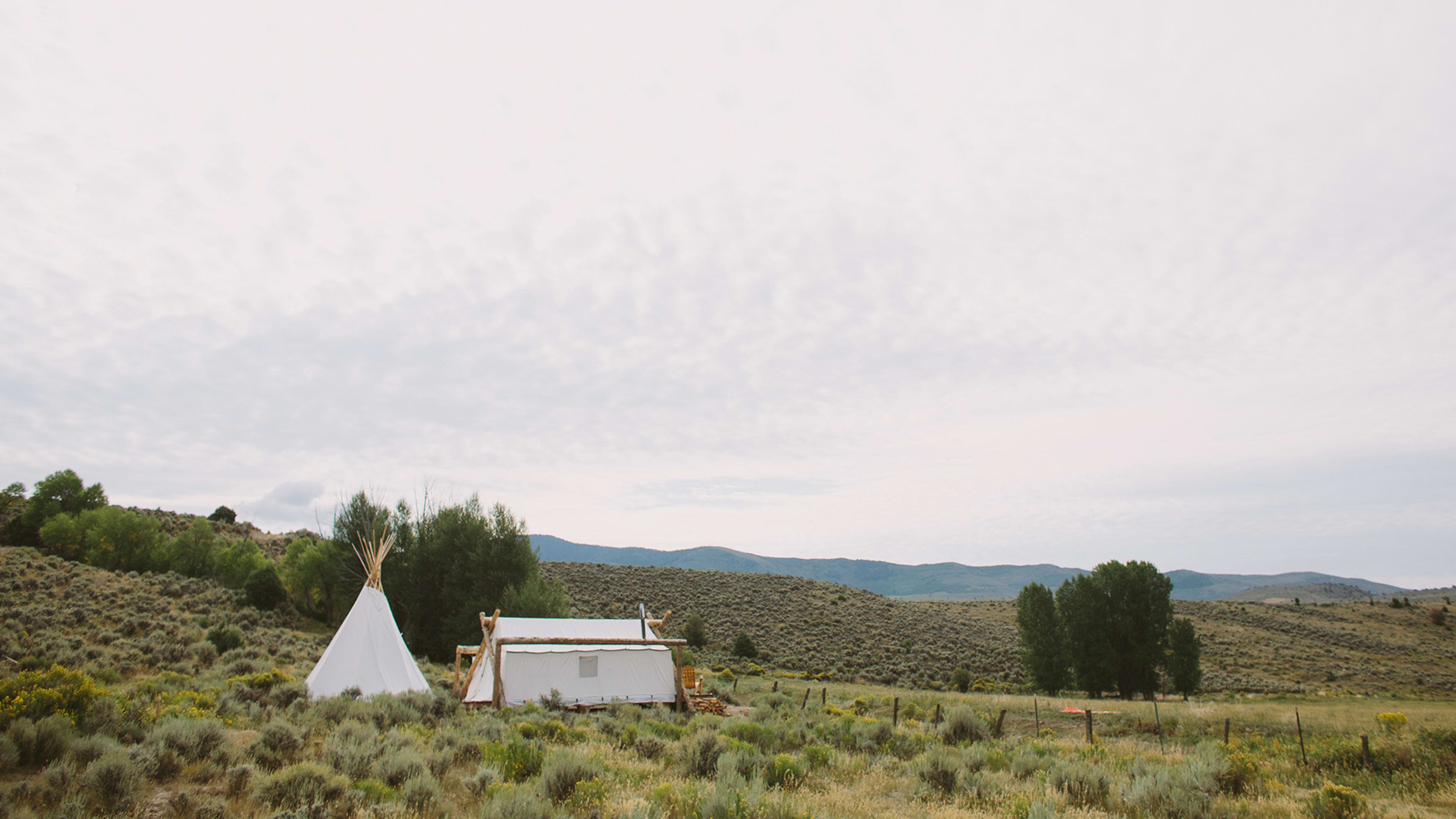There are pop-up restaurants, pop-up shops, even pop-up museums. The phenomenon is so widespread, it makes sense that it would eventually hit travel. With a motto of stay tonight, gone tomorrow, alternative hoteliers are investing in mobile, collapsible accommodations that have particular appeal to that most coveted of demographics: millennials. Some companies are setting up camp in areas low in hotel room inventory, like music festivals, while others are pitching tents in pristine countrysides, turning temporary hotels into a new type of guest experience—emphasis on the experience.
“Just like how over the course of the last 20 years, design hotels reinvigorated and advanced the hotel industry, I believe that in the next 15 to 20 years, experiential hotels will do the same,” says Peter Mack, founder and CEO of Collective Retreats, a startup that is attempting to redefine luxury stays in the great outdoors (also known as glamping).
Over the past year, Mack’s company has opened five-star retreats in the mountains of Montana, the vineyards of Sonoma, and the ranch lands of Colorado, with four more planned to open by year’s end in picturesque places where permanent hotels are not permitted.
Guests stay in spacious tents with electricity that are outfitted with 1,500 thread-count sheets, chandeliers, and WiFi. Each tent features a full en-suite bathroom with hot showers. Chef tableside dining is included at each locally sourced gourmet meal. Before bed, you can roast bourbon-infused organic marshmallows. Roughing it in the wilderness this is not.
But it is about as far as you can get from traditional cookie-cutter, mega-hotel travel. And there’s a reason for that. A recent study found that 72% of millennials (currently the U.S.’s largest generation) would prefer to spend money on experiences than on material objects. According to a Boston Consulting Group report, this same demographic is 23% more interested in traveling than older generations. A study by American Express revealed that nearly 70% of millennials want “a personalized travel experience” on their vacations.
It’s not just millennials who crave customized experiences, according to Jason Clampet, cofounder and editor-in-chief of travel site Skift. Airbnb, which is like a pop-up hotel in one’s home, has seen the largest growth in the last year in the over-50 sector. “A lot of travelers are now looking for an authentic experience,” says Clampet, using a buzzy umbrella term for trips that are customized, not standardized. “People like things that tell a story.”
Jan Freitag, SVP of lodging insights for the travel industry research firm STR, says he too has witnessed an increasing interest in these types of getaways. “Arguably, Airbnb is the best indicator that people want experiences that are personal, authentic, unique, and approachable,” he says. “Of course, now every hotel company has a boutique chain or soft brand, so everyone is trying to capitalize on this trend.”
White Glove Wilderness
Peter Mack developed Collective Retreats in response to what he calls the “vanilla-zation” and “McDonalds-zation” of the hotel industry. A 10-year veteran of Starwood, he got the idea for a pop-up hotel business while he was VP of customer experience and innovation at Tough Mudder.
Each year, more than 20,000 participants in the run through the mud would venture out to a small city, where $49-a-night motels had jacked up prices to well over $400. Price gouging, combined with an inadequate supply of rooms, irked Mack. “I remember asking myself, ‘Why don’t we just build our own hotel here out of tents?'”
He did, beta testing Collective Retreats with a select group of invite-only guests over the past year before opening booking to the public in March. That same month, the company received an initial seed round of $2.5 million from various investors who sensed an opportunity in catering to travelers’ growing desire for offbeat, Instagram-worthy nature vacations.
That’s the advantage Mack sees, in any case. “It was very clear to me that the whole hotel industry is broken,” he says, with a tinge of hyperbole. “That traditional hospitality and what consumers are looking for in hotel experiences has gone completely sideways.”

In his estimation, the traditional business model, in which most of the hotel group’s investment dollars go into the physical building, is outdated. Heavy-duty expenses like real estate taxes, massive laundry facilities, and commercial taxes are, he maintains, “things that don’t create a rich, wonderful experience for guests.”
Mack’s solution to some of these challenges can be found in the tents themselves, which are a relatively inexpensive investment (at least compared to the cost of constructing a traditional brick-and-mortar inn). This leaves more money to spend on decor, food, and recreation. And because the tents are collapsible, the company has the flexibility to add or subtract accommodations on demand.
And should a particular pop-up location fall out of fashion, Collective Retreats is not anchored there for good. It currently has five-year leases with the owners of the land hosting each pop-up, and no plans to purchase so much as a blade of grass. “We have no intention to own real estate or even buildings,” Mack says.
As his company’s name suggests, Mack wants to build a sense of community among guests, similar to the conviviality found in hostels—except in this case, it’s with a crowd that likes its nature with a side of truffle butter. Travelers are treated to a mix of activities, both communal (wine tastings) and solo (in-tent massages). And they don’t come cheap. Collective Retreats charges between $500-$700 a night during the spring and summer high season and $400 during shoulder season. The Yellowstone and Vail locations opened in March and already have waiting lists.
“Traditional hotels are very plain and very boring,” Mack says, sticking to his theme. “Today’s traveler wants a bespoke, curated experience. There is no brand that owns this space, which is what we’re trying to do.”

Blink takes the luxury service concept one step further. An exclusive new option from travel company Black Tomato, Blink debuted in December 2016, and arranges far-flung, remote accommodations meant to satisfy a deep-pocketed guest’s every whim. One simply picks a global region, and the company finds a distant piece of land on which to build bespoke temporary lodgings.
“Choose from places like glaciers, desert landscapes, and jungles, to wild coastlines and rolling savannahs,” reads a Black Tomato press release. Among the choices: domes in Morocco, yurts in the Bolivian Andes, or “lunar-like” spherical tents with transparent ceilings in the Chilean desert. Prices can range from $10,000 to $30,000 per person for three to four nights. The company is currently focused on groups of up to six travelers, but can accommodate any size.
Black Tomato owner and cofounder Tom Marchant says he was inspired by the pop-up restaurant movement. He wanted to expand the idea for demanding travelers willing to pay for an experience that cannot be replicated.

Festival Shelter
“Hotels have never been fuller,” he says. He predicts that 2017 will be another record-breaking year.
When it comes to pop-ups, Freitag sees the market potential in offering shelter to travelers during peak seasons or special events. “It’s a good idea because you don’t want to build an asset that lives 25 years for an event that lasts a week or a weekend . . . And the barrier to entry is arguably zero,” he says. “It’s a good idea that has its niche, but I think it’s a niche.”
Maybe so, but it’s a niche being explored by Marriott, which just announced plans to produce a pop-up hotel for Coachella 2017, one of the most popular millennial-targeted events out there. An official partner of the music festival, Marriott will provide air-conditioned safari tents exclusively to members of its loyalty programs, who bid points in an auction in hopes of securing a stay. The bidding opened at 22,500, and within three weeks has already topped over 200,000 points per tent.
The hotel chain is testing a market well known to smaller outfits like The Pop Up Hotel, which has been supplying accommodation tents at international music festivals for a few years now, complete with pop-up pools. U.K.-based Snoozebox also transformed giant shipping containers into what it calls “portable hotels” at the 2012 London Olympics and continues to target large-scale events such as the British Grand Prix.
For all its Coachella enthusiasm, Marriott is not committing to a future in pop-ups just yet. “Right now, our partnership with Coachella and its unique onsite lodging as part of the festival experience really created an opportunity for us to explore these branded tents for the first time,” says Karin Timpone, global marketing officer for Marriott. “We’ll see what the response is and what the future might hold for these kinds of opportunities, specifically with our music partnerships and events.”
A wait-and-see approach raises a legitimate question about how widespread a phenomenon pop-ups might become. As Freitag notes, scaling could be a challenge, compared to traditional hotels. How far can a company go with the concept? Could temporary luxe lodgings grow as big as Airbnb? Or are they merely a passing fad?
No, they’re not—not if Collective Retreats’ CEO has anything to say about it. In the coming months, Mack intends to branch out into a whole portfolio of temporary residences, such as luxury airstreams and epic tree houses, some in remote international locations. (Though not at music fests. “It’s really easy to throw up some tents at a festival and provide a place to sleep,” he sniffs.) In 2018, a total of 10 new retreats of this type will be available to bookers. He’d also love to step outside of the countryside one day and enter cityscapes.
“One of my dreams is to have a retreat in Central Park, surrounding Shakespeare in the Park,” he says via email after our initial interview. His other long-term plans include “a surf retreat in Costa Rica, or Kauai, for example. A Moab retreat right in Canyonlands, the Green Mountains of Vermont—places people daydream of.”
Recognize your brand’s excellence by applying to this year’s Brands That Matter Awards before the early-rate deadline, May 3.
